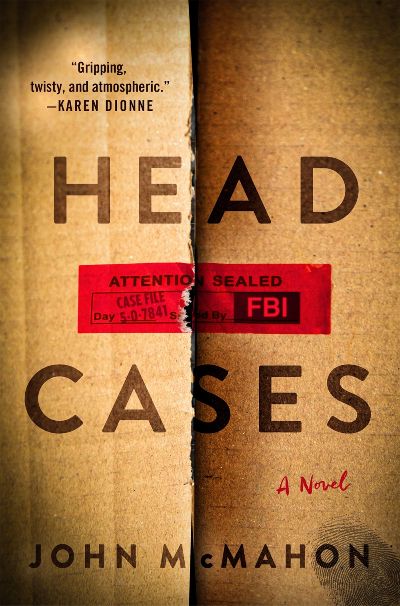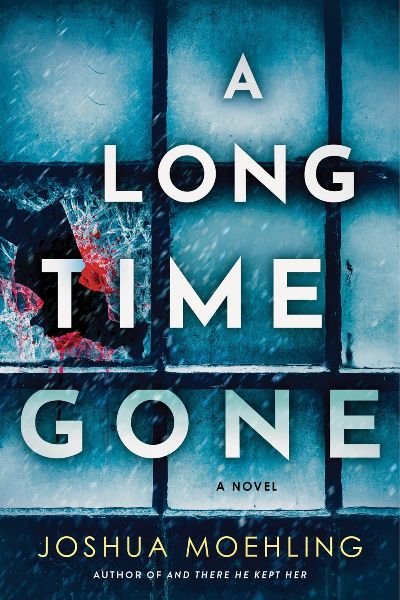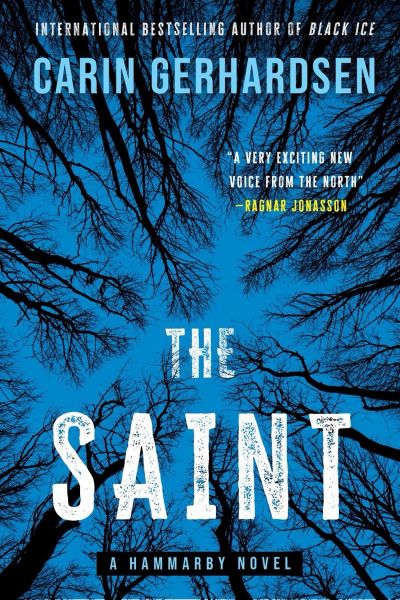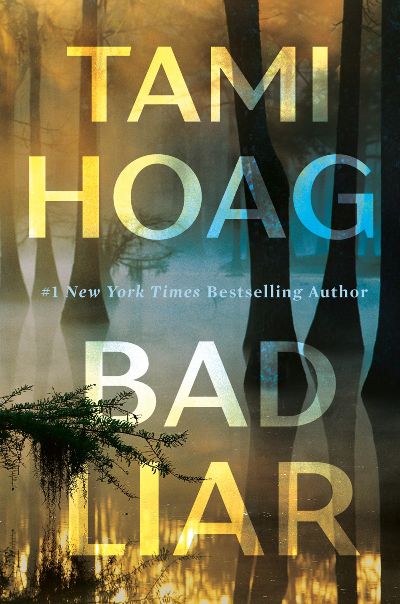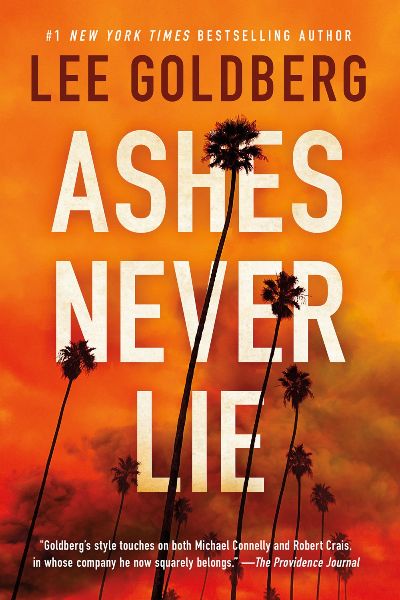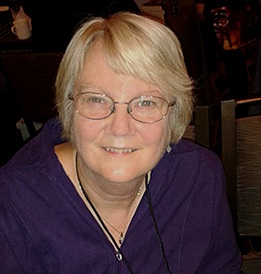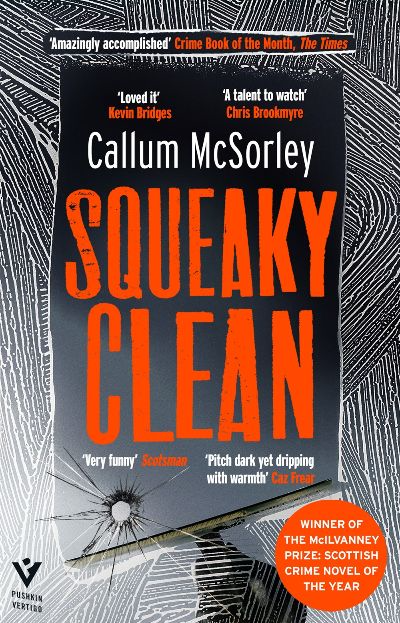Gardner Camden has found his perfect home in the FBI’s PAR, or Patterns and Recognition division. Like the department itself, Camden is thought of by other agents as weird, and it doesn’t help that he almost had PAR disbanded by making a terrible mistake that’s kept secret till near the end of the book. Still, he’s brilliant at noticing what nobody else does and relentless at finding the worst of the worst of criminals. He found one of those years before, dead in a fire. But in the case that opens this fascinating thriller, the same man is found dead at a crime scene, with numbers scrawled on his body. Next more killers are found murdered, also with messages to PAR, or maybe to Camden, at the scene. Finding out who is killing serial killers, and why, takes Camden and his lovable team on cross country treks and through psychological torture as the suspect won’t hesitate to go after all the team holds dear. Camden’s first-person narration brings readers inside the head of a steadfast but quirky man (“I’ve been called…Unconcerned. On the spectrum. A weirdo”) as he puzzles out wicked and tangled crimes and the minds behind them. McMahon’s debut novel, the first book in his P.T. Marsh series, was a New York Times Top 10 Crime Novel and a finalist for both the Edgar Award and the ITW Thriller Award, and his other books have been lauded as well. This is more great stuff and a must for your TBR pile.
Police Procedural
With a shooting in her past, Liverpool Police detective Sheridan Holler is already known to new chief inspector Hill Knowles when the no-nonsense woman takes the job. Sheridan’s first assignment under the new boss is related to a cold case: Ronald Parks was accused of killing his son, but was acquitted. Now two bodies have been found on the local beach. One is tied to a statue, the other buried so that he drowned when the tide came in. Sheridan must inform the victims’ next of kin, a young bookshop owner, of the deaths, and she becomes central to the case, suffering further losses and dreading the police’s next knock on the door. Given the circumstances, but also because of her doggedness at the job, Sheridan relentlessly pursues all the tenuous clues that come up. Nevertheless it seems that this case may go unsolved. While readers soak in the rich details of life as a year-rounder in an English seaside town, and Sheridan’s loving wife who’s sometimes exasperated at her partner’s dedication to the madness that is police work, Sheridan continues to pick away at the case, leading to a shocking conclusion. Note that there is particularly awful sexual abuse here. A startling and engrossing whodunit.
A new Higashino that will meet the expectations of his many fans, and then some. As is typical of Higashino’s unique police procedurals, the story goes both deep–into the past of its leading characters—and broad—Japan today, for example, where we learn about Japanese culture, such as the world of hostess clubs. The story begins with the discovery of a young man’s body in Tokyo bay; a bit of research reveals he is quite the loser who lives off his girlfriend while continuing to abuse her. But by the time the detectives locate their apartment, she’s skipped town. A likely suspect? Yes, but with an airtight alibi. Which draws Detective Kusanagi to “Detective Galileo,” a scientific genius and old friend, and the star of Higashino’s most well-known work The Devotion of Suspect X. In Galileo’s hands, connections are illuminated, the trauma of the past is brought to the forefront, and we learn the startling connections that link our characters. Brilliantly plotted and wonderfully rich in characterization.
The third in Moehling’s Ben Packard series is far and away the best. Deputy Packard is off work—he’s on leave, pending an investigation into a shooting—which gives him the time to investigate some new information about the disappearance of his older brother, Nick, who left their lakeshore family home when they were just kids, never to be seen again. The new information attracts his mother, Pam, to northern Minnesota, as much to check in on Ben as to explore where Nick may be buried. Pam—one of Moehling’s greatest creations—is a New Age, crystal wearing, sex-positive, Wiccan practitioner who would like nothing more than to see Ben find a boyfriend and does everything in her powers to hook him up. While the search for Nick takes a bit of a back seat, Ben can’t help but pursue a far more expansive and contemporary investigation that exposes corruption among County officials. See why so many people were happy to see Ben out of the picture? Add to this another story, brief but hugely meaningful, that provides yet more information about Nick. It’s amazing how Moehling keeps all these narrative balls in the air, but even more amazing is how they eventually come together. For those who love classic mysteries, police procedurals, and family drama.
An excellent standalone that reaches back into Iceland’s history, prying open a past many would like to keep hidden. At the center of the story is criminology student Helgi Reykdal, who is back from studies in the UK and ready to join the Reykjavik police. Helgi is finishing his dissertation, which is focused on the famous murder of a nurse at an old, little-used Icelandic sanatorium some forty years ago. In all, there were six suspects at the sanatorium and two detectives. The case was never truly closed, and Helgi uses his dissertation to quietly investigate the remaining suspects, encountering only suspicion and hostility along the way. It’s a tight cast, and Helgi keeps his inquiry moving rapidly between 2012, the present day action; 1983, when the murder was committed; and 1950, when the sanatorium was home to tuberculosis patients. Despite the seriousness of the story, and some horrific depictions of domestic abuse, Helgi’s passion for Golden Age mysteries lends the novel some unexpected humor and fun. Highly recommended for a large swath of crime-fiction readers.
The fourth in Gerhardsen’s best-selling Hammarbyeries reveals a horrible history in a Swedish town that on the surface seems to revolve around soccer games, poker nights, and kindness to those less fortunate. The first break in the idyll, and the opening of the book, is the shooting of Sven-Gunnar Erlandsson, a man whom everyone knows as a tireless soccer coach, helper of the homeless, and devoted father. If the investigators begin to think that maybe he’s a little too saintly, well, that’s probably just their long years encountering the worst of society. As the police look in ever-widening circles at the dead man’s family, friends, and acquaintances, it starts to seem like he might have been the only good person around, surrounded as he was by dark secrets that are slowly and shockingly revealed. (Even the last sentence drops in a twist.) Every character, including those who are missing for years, is given a fully rounded personality here, and it’s quite the large cast. Gerhardsen’s masterful plotting takes us around multiple metaphorical corners, possible killers, and surprise victims in her character- and emotion-driven saga. Maybe it’s time to get back into Scandi noir–and you don’t have to have read the previous books in the series to enjoy this one
I could have sworn that Tami Hoag had an Oprah Book Club pick years ago. That’s what spurred me to pick this up–I usually like Oprah’s picks, and if one of those authors has something new, I’m intrigued. It seems I was wrong, but the happy mistake led me to meet the steadfast Sheriff’s Office Detective Annie Broussard and watch her doggedly investigate three maybe-interlinked crimes in her small south Louisiana town. Local fishermen find a body in the water, its face shot off. There are soon two possibilities as to whom it could be, as two local men are found to be missing. One, Marc Mercier, is a former high-school football star in a town where the sport is everything, who’s returned from time away to his doting mother’s embrace. His Yankee wife is none too happy to be stuck in “Ass Crack, Louisiana,” and might be getting “comforted” by a suave coworker. Also nowhere to be found is Robbie Fontenot, a doctor’s son who has gone off the rails due to Oxycontin addiction. His own doting mother believes he’s on the mend and is desperate for someone to care about where he could be, but not having much luck till she storms the sheriff’s office and meets Annie. Rural loyalties, mothers’ love, sibling rivalries, a hefty dose of Cajun language and slang (glossary provided), and swampy humidity steaming off the pages combine to make a memorable and affecting read. Oprah, take note!
What’s better than a gripping story that also teaches you a ton about a fascinating subject? That’s just what readers will get in Goldberg’s follow-up to Malibu Burning (2023). This time, odd-couple Los Angeles arson investigators Walter Sharpe and Andrew Walker are faced with several perplexing crimes. The central case involves a series of just-built, as-yet-uninhabited homes for the wealthy that combust in a far more explosive way than an empty house. Then there’s the man who’s found dead in a fire, but the fire didn’t kill him. Fraud pokes its head up too, with all keeping Sharpe—a genius with fire investigation, but socially not so much—and his still-learning partner busy with intriguing theories based on detailed descriptions of the workings of fire, accelerants, and more. The characterization here is wonderfully enjoyable, with the partners and their various associates bantering in ways that’s sometimes hilarious and always reveals the human behind the shield. Goldberg’s author’s note helpfully details the books about fire dynamics and investigation that he used for research, and readers may want to try these as well, notably Fireraisers, Freaks, and Fiends, “Torchered” Minds by former LA County arson and explosives detective Ed Nordskog, who also answered questions for the book.
A missing nine-year-old boy has Deputy Mattie Wray bring her K-9 partner, Robo, into uncharted territory to initiate a search and rescue for him in Mizushima’s latest terrific series. By leaving Colorado and heading to the Olympic Mountains of Washington State, Mattie risks Robo’s job and delaying her wedding. From the start, the information she and the team of searchers receive is a bit sketchy. When one of the other searcher dogs gets ill, it becomes clear that someone doesn’t want the team to find this boy. Since the missing kid is the son of a celebrity, and the longer he’s out in the wilderness, the louder the clock is ticking to still find him alive and keep away the paparazzi. Mizushima’s series engages on every level: the authenticity of the search scenes; the setting, in which the reader can feel the moss and dampness of the region; and the insight into the operation of coordinated efforts to find missing people. Gathering Mist is the perfect place to start if you are unfamiliar with her previous novels, and Robo is the most incredible dog ever. Who’s a good boy?
Davey Burnet’s life is boring, tough drudgery, made no easier by his shame and frustration over having caused a lot of his own problems. He works at a Glasgow car wash where the work is both boring and freezing and the annoying customers bested only the even more draining pothead boss. But Davey wishes for the boredom back when an impulse decision brings a world of trouble down on him and the business. After nouveau-criminal-riche Paulo McGuinn takes to bringing his ostentatious vehicles to be cleaned and Davey “borrows” one of them to make it to a custody hearing for the daughter he desperately wants to see, the car is wrecked and suddenly Paulo is the de facto owner of the car wash and of Davey’s grim future. Paolo’s just-one-of-the-lads bonhomie is a wafer-thin veneer over viciousness; not taken in by it is DI Alison McCoist, whose pecking away at the car wash’s goings on are Davey’s only hope. While this fast-moving tale is dark and has moments of real terror, it’s also grimly hilarious, especially in McSorley’s skewering of Paolo’s inflated self regard. The dialog takes some getting used to, with the character’s thicker than thick Glasgow accents faithfully reproduced, but once readers acclimatize they’re in for a rollicking, satisfying read.

